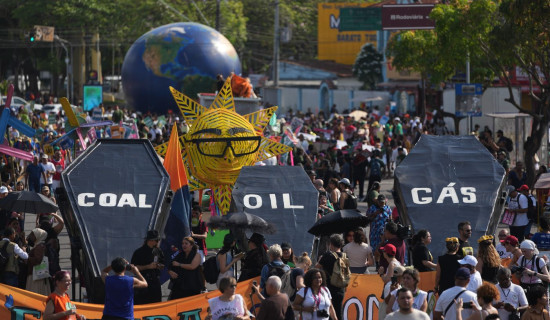- Monday, 17 November 2025
Portents Of A New Global Order
Thanks to his stance against American President Donald Trump’s threat to annex Canada as the 51st state, Prime Minister Mark Carney firmly rejected vulgar talk with “Canada is not for sale”. The stance enabled Carney to not only stem his Liberal Party’s fall in public approval rating but also went on to enable it to improve upon its previous strength and emerge as the largest group in parliament. It was a historic turnaround. As soon as he was sworn into office in January, Trump had no qualms about setting lusty eyes on sparsely populated Greenland for its vast natural resources. That gave a predator image to the superpower nation’s global image, particularly when a new world order was gathering steam.
Such and other domestic factors have assembled a line of prominent personalities who are highly critical of the United States’ president. Hollywood’s star and an Oscar winner, Robert de Niro, recently ranted on Trump as a monster. “He is a mean, nasty, hateful person—and a sociopathic, psychopathic, malignant narcissist.” In an interview with The Wire, the Australian National University’s Professor Ramesh Thakur made unflattering remarks. His narrative: “Trump’s narcissism in his art of the deal collides with Modi’s hubris… India cannot be relegated to a vassal state instead of a respected partner…But tariff king Trump has no permanent personal attachments, only shifting transactional interactions in search of the next good deal for America.”
Peace prize politicised
Venezuela’s President Nicolas Maduro ordered his country’s embassy in the Norwegian capital of Oslo to close after the Nobel committee awarded the 2025 peace prize to Maria Corina Machado, a prominent Venezuelan opposition leader. Machado’s strong support for American military moves near her country has put off many of her compatriots as something against their national interest. Powerful parties collapse and crumble under the weight of contradictions underscored by stark differences between their public promise to deliver and how they actually perform. Many a leader can be found to fall for flattery from hangar-sitters, and permanent cheer leaders who unabashedly claim “the world will fall without our leader” or the world is grounded without his talent.
Minority or coalition governments face constant hassles from constituents demanding their pound of flesh, or spoils for their backing. Frequently, the political landscape is clouded by the spectre of uncertainty that fuels public dissatisfaction toward various institutions and sectors. Difficult times in a country serve as troubled waters for major powers to go fishing for their target catch. Aid politics plays a significant role in this game. Former US Congressman Ron Paul made a striking remark: “Aid is taking money from the poor people of a rich country and giving it to the rich people of a poor country.” The difference is also brought into sharp focus by the age-old saying about giving a man a fish and teaching the man to fish.
When politics is dominated more by propaganda designed to create celebrity status for mere effects rather than substance that creates positive impacts, democratic governance gets short shrift. Leaders in positions of power often indulge their close ones at the expense of their own reputations, which can lead to adverse reactions against authorities. Empty rhetoric is exposed for its hollowness. Institutions and individuals in the limelight are treated accordingly. Rental politics of gathering paid crowds to public rallies for creating a façade of popularity might work for a brief spell, but only to get derailed subsequently. Berlin, Brussels, London and Paris are some of the European Union member capitals that witnessed large demonstrations this autumn against a range of issues, mostly those about fiscal policies, scarcity of well-paying jobs, and immigrants.
Critics say major powers design to steal the resources of another country under a false flag of one pretension or another, including human rights, democracy and “strategic interest”. In a deepening development since October, the oil-rich Venezuela is under immense psychological pressure, which could be a US target for direct intervention. Venezuela could even become a Latin American Cuba in terms of painful economic and other sanctions.
China counters threats as not the way to conduct trade. In continuation of this policy, Trump’s meeting with President Xi Jinping was delayed. Xi does not go out of his way to receive someone engaged in what he sees as constant hostility. Beijing, which controls 90 per cent of world’s rare earth processing, has given enough indications of using the export to the US as retaliatory measures.
Caution vs inconsistency
US dependence on Chinese minerals is heavy, which includes components for military equipment and space technology, as the world learns the lessons of integrating without the supply chain of a perennially hawkish troublemaker. Hence, trying to strangle a well-equipped power with tariff weapons has its repercussions. Aggression through trade, transport, allies and intelligence agencies inevitably leads to a fight back by a sovereign state that says enough is enough, and rejects conditions of having to take things lying down. Beijing moves cautiously but with consistency, while Washington blows hot and cold alternatively.
Undisputed No. 1 superpower in the post-World War II decades, the US appears to be pushing things too far against China which is not without contingency plans. The communist country’s economy is more resilient than that of its key rival. In a prolonged full-fledged trade war, the No. 1 superpower has more to lose than its Beijing. Reports indicate that Beijing is restructuring its industry and manufacturing priorities, which are more inward-looking. Washington needs to first take initiatives to reduce its reliance on countries it does not see eye to eye, though it is not an easy task.
Europe, on the other hand, is absorbing the Sino-American trade conflict as a valuable lesson to decide on how not to antagonise a major rival without the consequent shock-absorbing capacity. In a visibly emerging multipolar world, major powers and big neighbours need to note that arm-twisting does not pay off the way it previously did. Its long-term consequences will be deep and durable.
(Professor Kharel specialises in political communication.)















